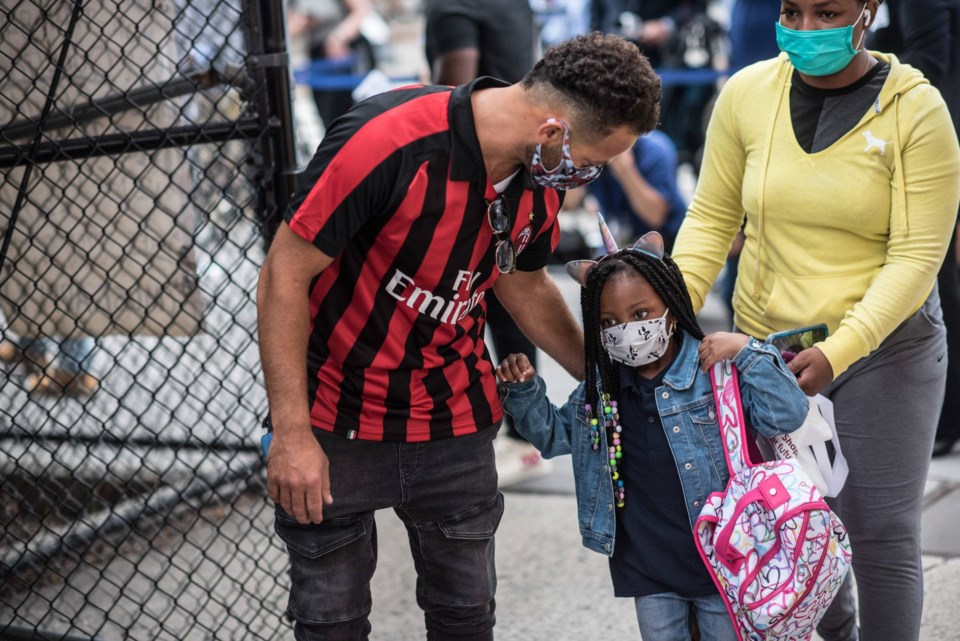New York City public schools will be closing Thursday in an attempt to halt the growing second wave of coronavirus in the city, Mayor Bill de Blasio and Schools Chancellor Richard Carranza announced Wednesday.
Ever since schools had a phased reopening in September and October, the mayor has said they would have to close again if the city's 7-day average positive test rates for COVID-19 went above 3%, and that day has come.
De Blasio warned parents last week that schools could close as early as Monday, given the sharp increase in positive test results in the city. Parents have vigilantly been watching the numbers, waiting to see when the rate inevitably climbed above 3% closing the largest public school system in the country.
Although most students — around 75% -- are already enrolled in full remote learning, the move will hurt those families of the 300,000 students in Brooklyn and across the city that relied on in-person learning for a variety of reasons, many work-related.
In a letter to parents, Carranza said the closure was temporary and school buildings would reopen as soon as it was safe to do so.
Since schools reopened, nearly 1,500 classrooms were temporarily closed after students or teachers tested positive for the virus and the city instituted localized shutdowns in neighborhoods deemed coronavirus "hotspots."
Despite closures and rising COVID-19 cases, schools have not been responsible for spreading and transmitting the virus.
Brooklyn Borough President Eric Adams said last week that before the city moved to shutdown schools without virus cases, it needed to explain why comprehensive testing and tracing to prevent outbreaks was either not available or effective.
"Full shutdowns were necessary when we had virtually no testing capacity or knowledge of the virus. Now we know that robust testing combined with strict protocols around mask-wearing and social distancing can be extremely effective," Adams said on Twitter.
"As serious and justified concerns on the sharp rise in COVID-19 cases spark a move toward decisive action, we must be far more strategic than we have been to date about the restrictions government puts in place. The last thing we should do is unnecessarily compromise the futures of our students by further overloading a remote learning system that has been a disaster — especially for Black and Latino and lower-income families."
A citywide family and student survey largely informed how schools reopened months ago. And despite the issues, the survey showed 72% of parents preferred to send their child back to school if safety measures were in place, such as mandatory mask wearing, temperature checks, COVID-19 testing and socially-distanced classrooms.
The original date for the start of in-person learning in New York City was set for Sept. 10, but de Blasio pushed it back to Sept. 21 after the union representing the city's teachers threatened a strike over unsafe conditions and understaffing.
Then, acknowledging the school system had still not fully overcome the many logistical issues it faced, de Blasio decided to phase students in rather than have them all return at once, pushing the majority of school openings back until September 28 and October 1. De Blasio said he understood the stress caused by his decision to delay openings.
At the time of reopening, Michael Mulgrew, the president of the United Federation of Teachers, said reopening success was "thanks in large part to the incredible efforts of tens of thousands of teachers and other UFT members who have worked relentlessly to serve their students while seeing that the children, their families and their colleagues remain safe."
Despite the swift closure of the city's schools, indoor dining and gyms -- despite facing renewed restrictions -- are still open in the city and state. Unlike with the public school system, de Blasio does not have the authority to close down businesses.
At a news conference on Wednesday, Cuomo said he would shut down indoor dining and impose other restrictions when the state's data showed the city had hit a 7-day positivity rate of 3%.




